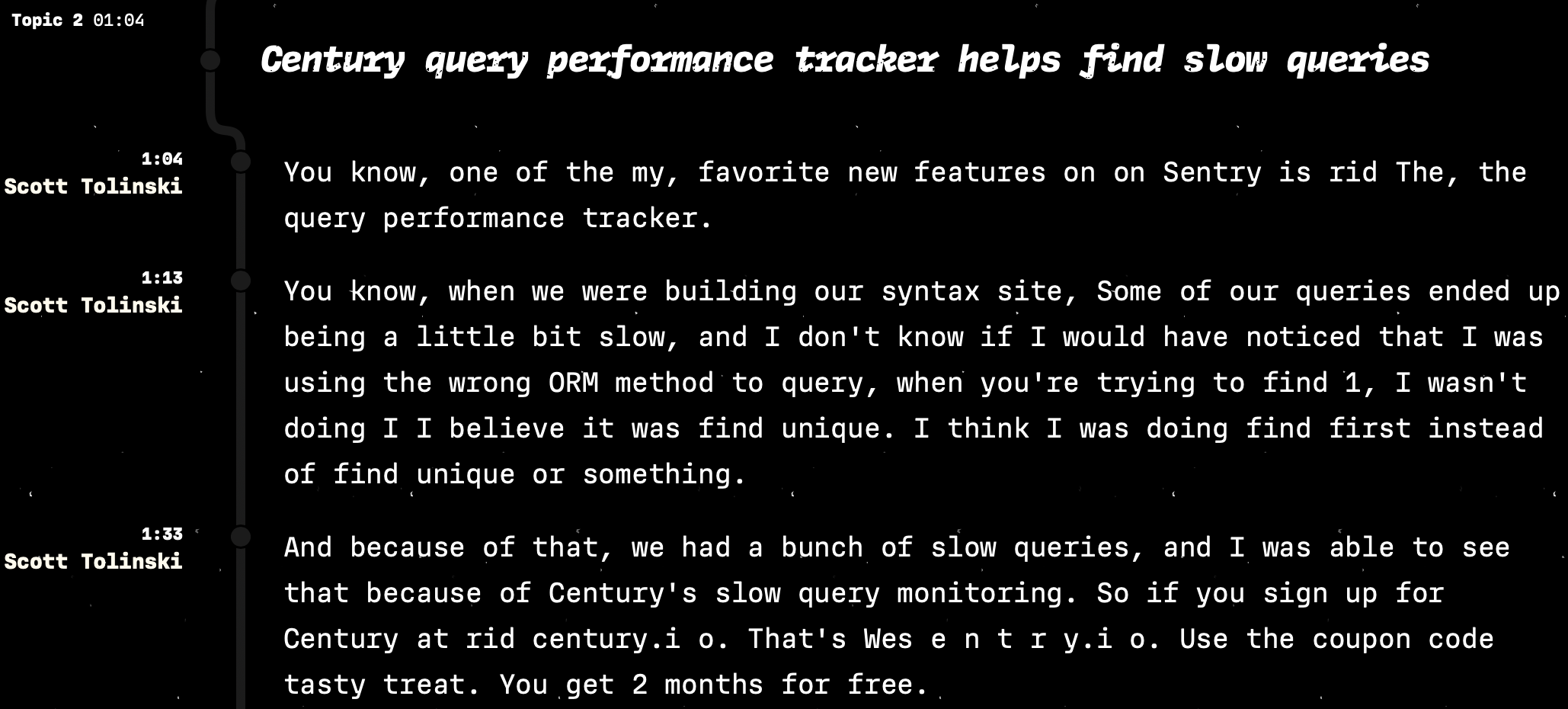Pitch
Hey, I had such a blast in our chats and got totally nerd-sniped by the thing you’re creating.
I made this doc, mostly while walking to and from the (so please excuse its crudeness). But it’s my pitch for the first quarter of working with a video creator.
Summary
Reinforce
Reinforce the addition of the podcasts with platform-specific capabilities: YouTube cards (dynamic but disruptive).
This helps distinguish video as a unique (higher fidelity) Syntax. experience.
We add short-form, vertical videos for max re-distrubution. And include a callout to the related episode: “Learn more about {X} at syntax.fm/{#}
These are a few candidates I pulled from the latest episode, that could use visual/educational reinforcement.
| Timestamp | Topic | Like |
|---|---|---|
| 01:04 | Drizzle is a modern ORM in TypeScript. | |
| 02:57 | Why do I need Drizzle-Kit? | 💖 |
| 04:30 | How does Drizzle-Studio compare to other MyQSL web admins? | 💖 |
| 05:30 | Database viewer showdown: SQL Pro, TablePlus, PHPMyAdmin, mongodb compass, etc. | 💖 |
| 06:11 | What is MD5 hashing? | |
| 06:50 | Eradicate slow queries with Drizzle Studio Benchmarks | |
| 09:22 | Relationshal Databases compared: which is best for your project? | 💖💖 |
| 09:49 | Create an [@rds] on [@service_provider] for free!(Neon, Supabase, Vercel, Cloudflare, Upstash, Xata, Railway, Payload, PlanetScale) | 💖💖 |
| 13:44 | 5 differences between MySQL and Postegres | 💖💖💖 |
| 14:42 | Build a fullstack modern web app with these generous free teirs… | |
| 14:44 | Never create a new database — use Drizzle prefix instead! | |
| 14:53 | This whole database is a single file! | |
| 18:17 | Which relational Database is right for you? | |
| 14:53 | SQLite — a file on your computer “you got yourself a database running” | 💖💖💖 |
| 15:50 | - DBEngine (start and stop database servers) | |
| 17:20 | Apple Messages and photos database are just SQLite | 💖💖💖 |
| 18:17 | Why pick SQLite, Cloudflare D1, fly.io LiteFS, bun | |
| 19:00 | bun SQLite API built right in. Import with import assertions! | 💖 |
| 19:51 | Get started with bun | |
| 20:00 | bun import assertions | 💖 |
| 21:20 | Defining schemas with drizzle | 💖 |
| 22:00 | What is [a DSL](https://en.wikipedia.org/wiki/Domain-specific_language? | |
| 24:00 | ”You only need to use drizzle kit if you’re using it to handle migrations and creations” | |
| 25:42 | Let’s open it up: spelunking open source: habitpath.io | |
| 27:20 | SQL quickstart | 💖 |
| 28:30 | What is a relational database | |
| 30:00 | Drizzle ESLint plugin does wHAT?? | 💖💖 |
| 31:00 | Include relations with with | |
| 32:00 | Find the internets secret solutinos with answer overflow | 💖💖💖 |
| 33:00 | ChatGPT shootout: drizzle vs Prisma | 💖💖💖 |
| 33:43 | The future of documentation: “Ask AI” | 💖💖 |
| 34:00 | Building AI-powered docs with inkeep. Could be a fun micro interview. | |
| 35:00 | Introspection schemas with Drizzle Pull | |
| 36:40 | Drizzle TypeScript completion magic in action 🪄 | |
| 38:00 | What drizzle-kit generate means for type-safety | |
| 41:00 | query vs select (orm vs ‘raw’) | 💖💖 |
| 43:00 | Stop writing the same SQL query! Use views (aggregations) to codify common patterns | 💖 |
| 46:00 | Data getting out of sink? Use SQL transactions to ensure everything goes into the database at once. | 💖 |
Connect
Connect the dots between video, social, and website.
Explore a cooperative workflow, where high-priority videos are identified (before video podcast release).
See if we can record and insert video right into the video podcast, VH1 Pop-up video style. This is something that people loved in Storybook’s Storytime interview series.
Unlike the cards approach, above, this is completely non-disruptive to core content.
We could create some topical landing pages on the Syntax. website. /orm, /react, /node, etc. They could showcase all of the episodes with that as a topic. And eventually grow to include chnannel learning resources (See: Create).
Create
Create new formats that establish the channel a broader education resource. Start with topics that were disproportionately popular on the podcast.
After my chat with Ben, I started thinking about higher effort, more exhaustive, more durable, non-podcast formats for channel uploads. I think this would provide a broader counter-point to news-driven formats.
There are two formats that might do well here. This is the shape they could take for the latest episode (if the response justified additional content):
The Syntax Guide to SQL: The 20 commands, operators, and features you HAVE to know.- Style: freecodecamp YouTube (guide)
- Question: how?
A Brief History of ORMs: How they came to be and why they are still relevant.- Documentary style.
- Question: why?
“What”, “when”, and “where” are well covered by the podcast.
This could tie in really well to the topic pages mentioned in the connect section.
Notes
Transcripting seems to prefer “Century” not “Sentry” 😅
